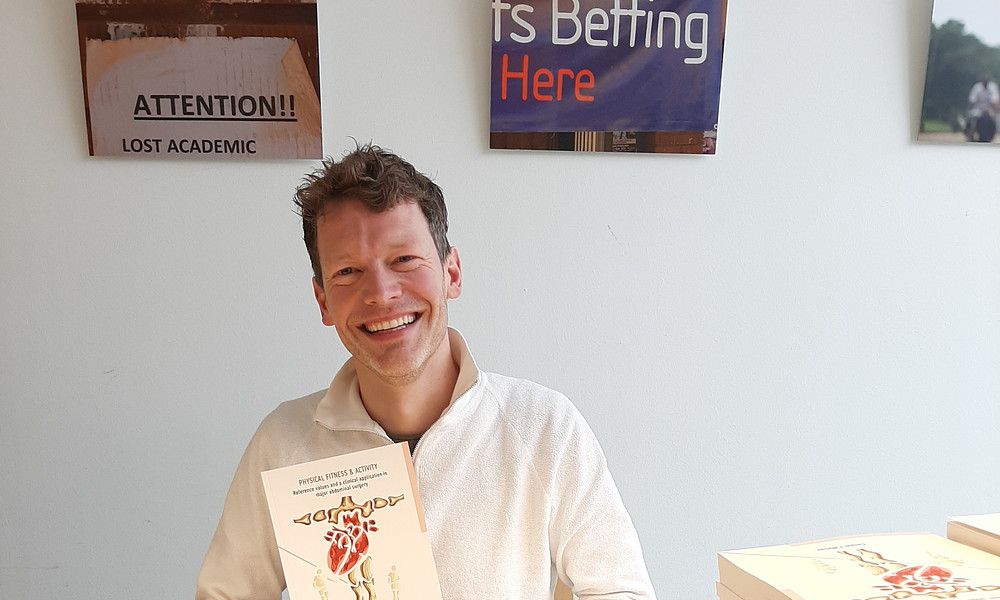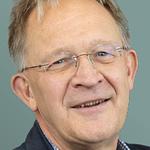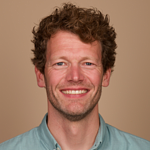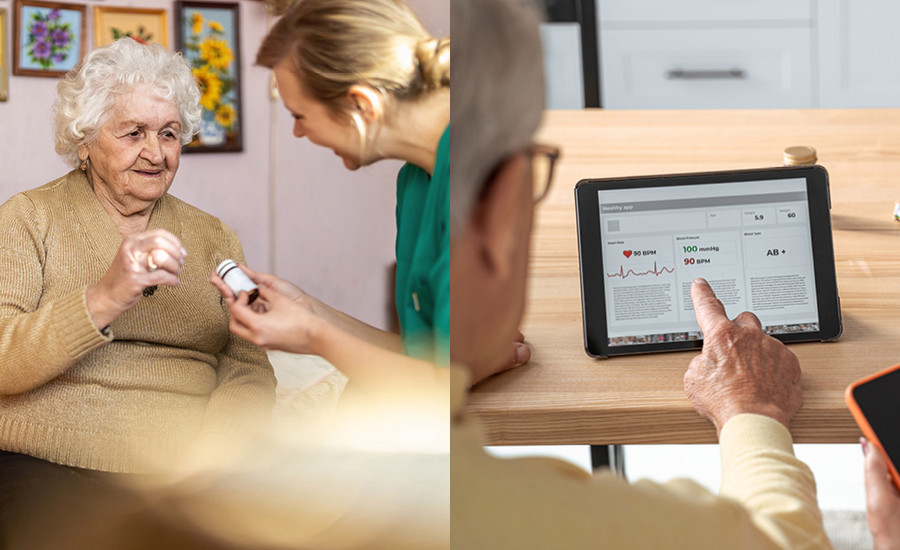Exercise helps, even before surgery
- Research stories

Is it smart to work on the fitness of patients before they have to undergo major surgery? Yes, says Caspar Mylius, lecturer-researcher at the Healthy Ageing, Allied Health Care and Nursing research group, who obtained his PhD on this subject.
Caspar Mylius measures the physical condition of patients by comparing their fitness with that of healthy people. 'Everyone has a maximum oxygen uptake,’ he explains. ‘That's a measure of your health. A top athlete like Jonas Vingegaard, the winner of the last two Tours de France, is said to be at 90-plus. Men his age are on average around 45. For my research, I looked at how fit the Dutch population is. So how much oxygen can they absorb? We had access to a huge database of fourteen institutes spread across the Netherlands. Can we find the healthiest possible population and use it to compare it to other groups?' Mylius' answer was a resounding yes.
Mylius then analysed exercise behaviour and prehabilitation, i.e. the methods you can use to improve the condition of patients before they undergo surgery. The idea is that this will allow you to recover better and faster after the procedure. 'We focused on examining patients who have to undergo major surgery on their liver, pancreas or gallbladder.' In this patient group, Mylius examined how much they exercised. In major surgeries like this, there is an increased risk of complications if oxygen uptake drops below a certain threshold. What is the effect of interventions on the exercise behaviour of these patients for how well the operation succeeds, and for the recovery period? ‘The research shows that a higher level of exercise before surgery results in a faster functional recovery,’ Mylius says. It was also possible to improve the level of physical activity of these patients during the waiting period before surgery. 'That sounds obvious, but health insurers are not yet prepared to reimburse prehabilitation. Demonstrating it with more research should convince them.'
Another problem is that this group of patients often has a lifestyle that has contributed to their condition. A change of lifestyle is necessary, but you can't change a lifestyle in four weeks. Certainly not because of the stress that patients experience in such a situation. 'That was also one of the reasons for our research. Is it even possible to make these patients more active through interventions? The fact that we succeeded is step one.'
If complications arise during surgery, it is often due to an excessive reaction of the immune system. The goal is to calm down the immune system, as it were. 'A number of studies suggest that there are fewer complications when patients in very poor health go into surgery with higher fitness. This may be due to a better immune system response. But more research needs to be done on that. Mapping the immune response is important. If you can show that training affects the immune system, then you can't ignore it. Then you could even say that you have to do some training before you can have surgery.'
In addition to being a researcher, Caspar Mylius is also a lecturer in the Physiotherapy programme at the Hanze. 'Students are the professionals of the future. We want to include them in research and the development of knowledge.' Within the programme, research is set up in such a way that students can participate in research in the third year and in the graduation phase. 'For my research, three students started collecting data with me. We worked together with the UMCG, Medical Spectrum Twente in Enschede and with Medical Center Leeuwarden. We talked to patients and took tests. The students used that data for their thesis.' Rebekka van der Laan was one of those students. She wanted to participate in this PhD research and not do a much smaller research project herself. 'As students, we have really been able to contribute and I notice that it has helped me a lot during my work, and now, during my master's, it still does. For example, by looking at literature with a critical eye and looking critically at your own writing. And what do I ask of people, the patients and the nurses, for example? As a result, I have been able to better empathise with what is happening there.'
Prevention is playing an increasingly important role in the education of the Physiotherapy programme, where they work a lot with cases. A patient has a particular complaint and that is the case around which a theoretical framework is offered in which practical skills are discussed. Mylius: 'In the framework Chronically Ill, we want to offer a prehabilitation case soon. How should you prepare a patient for surgery and what does it involve? That wasn't part of it before, but we're now trying to incorporate that into our education.'
During the defence of Mylius' thesis, a discussion arose about the measuring instruments he used. 'It won't be long before we can monitor a whole range of health parameters. Companies like Apple and Garmin have access to ours. I think we are moving towards a situation where the practitioner can supervise this process. I often give students the example if you are going to run a marathon, what are you going to do? Are you going to prepare or are you going to lick your wounds afterwards? Well, they think it's all very simple. Yes, you're going to prepare. In sports, this is about nutrition, about psychological resilience and about the degree of training. We have a lot of knowledge about this in sports and we can apply it. We can help a lot of patients with this as well.'
Caspar Mylius obtained his PhD under the supervision of prof. dr. C.P. van der Schans and Prof. J.M. Klaase on 28 February 2024 at the University of Groningen on the PhD thesis: Physical Fitness & Activity. Reference values and a clinical application in major abdominal surgery.

Lector Analysetechnieken voor Praktijkgericht Onderzoek
Petrus Driessenstraat 3, 9714 CA Groningen

Onderzoeker lectoraat Healthy Ageing, Allied Health Care and Nursing
Petrus Driessenstraat 3, 9714 CA Groningen

Would you like to know more about the professorship Healthy Ageing Allied Health Care and Nursing?
Visit the page of the professorshipHow satisfied are you with the information on this page?